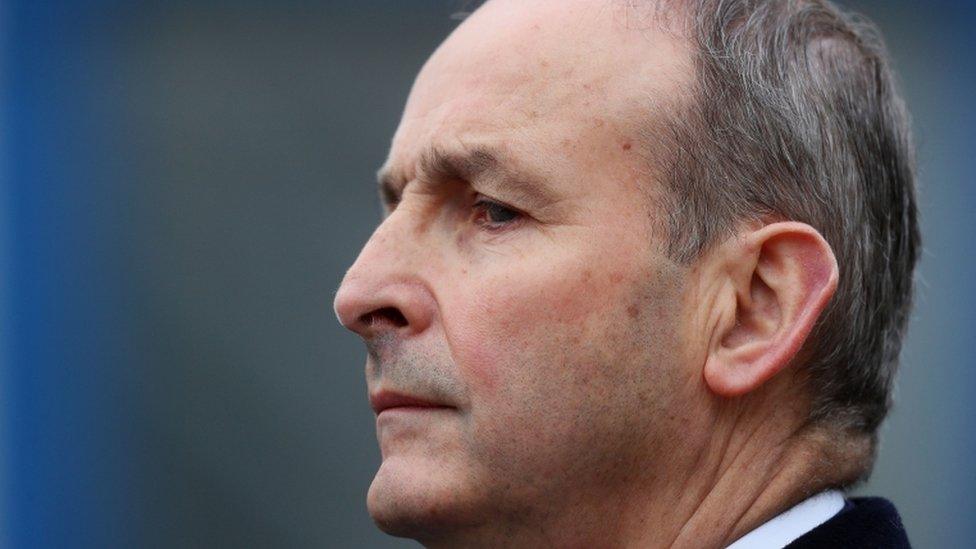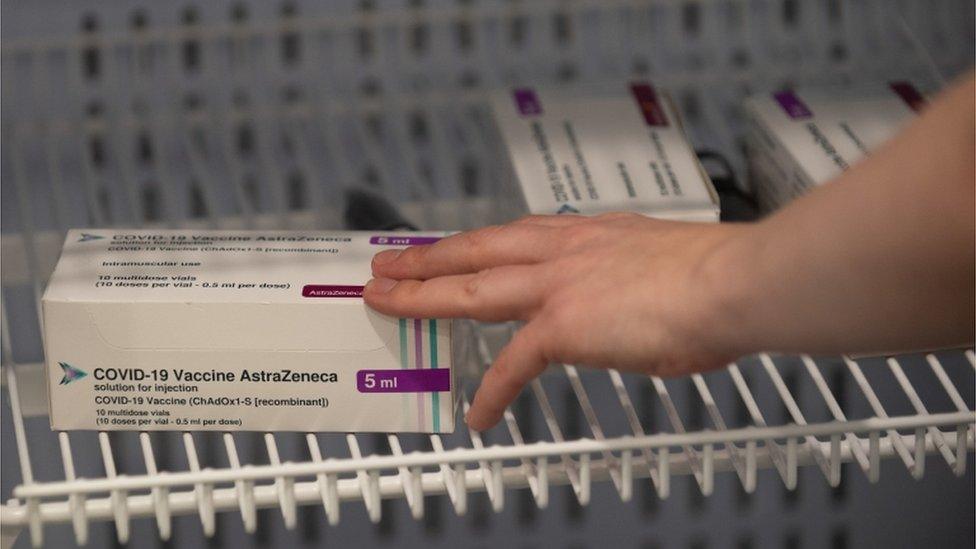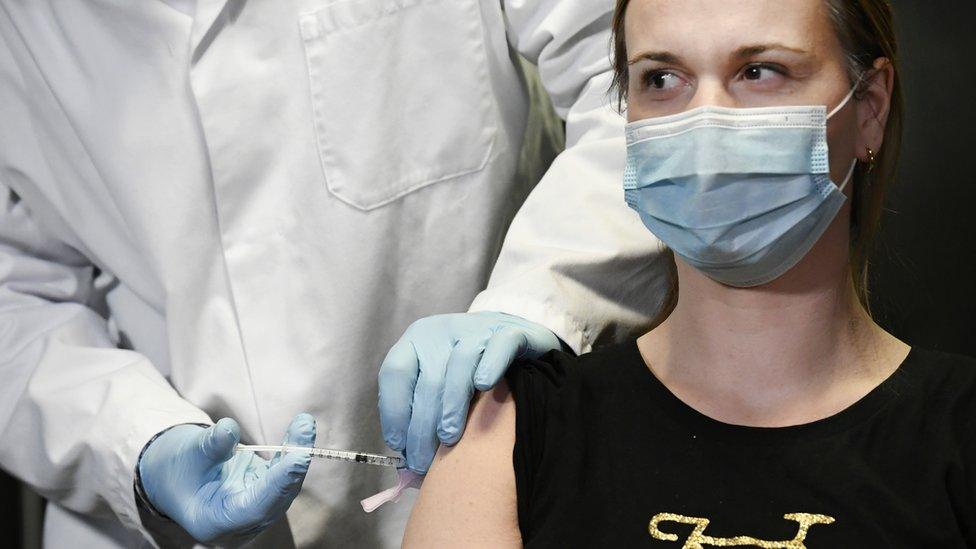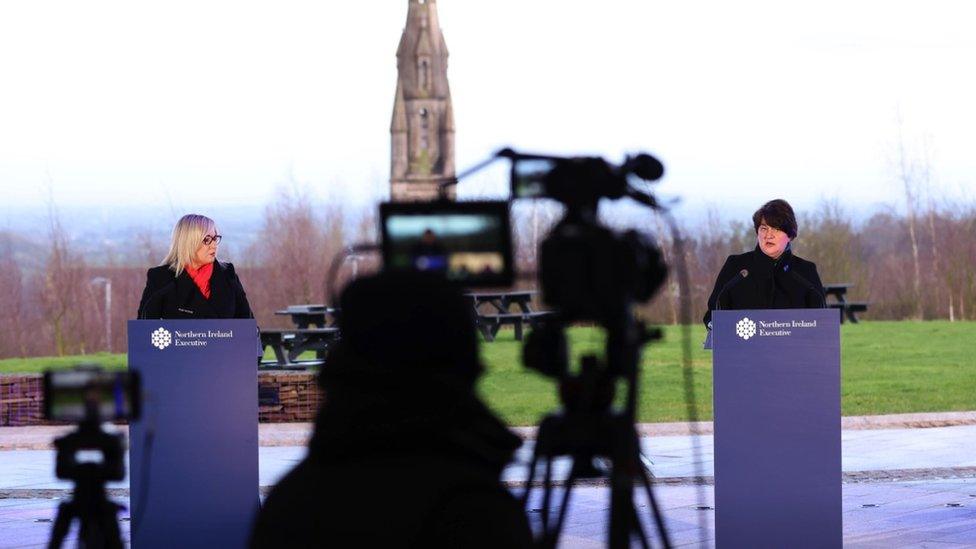Covid-19: Republic's restrictions 'in place for six months'
- Published

Micheál Martin has said restrictions will not be relaxed as planned later this month
Taoiseach (Irish PM) Micheál Martin has said he expects Covid-19 restrictions to remain in place in the Republic for the first six months of 2021.
He described the government's approach to lifting restrictions as "conservative and cautious".
Speaking to RTÉ on Saturday, Mr Martin said it would not mean a full lockdown, and restrictions would change as more people were vaccinated.
He said that "large-scale vaccination" will have been achieved by the summer.
During the interview on the Brendan O'Connor Show, Mr Martin said the issues which had affected the EU's supply of vaccines had impacted the Republic.
A production problem with the Oxford/AstraZeneca vaccine has meant the number of initial doses to the EU will be lower than expected.
Mr Martin highlighted the slow down in the delivery of the Oxford/AstraZeneca vaccine as a potential issue, but said the Pfizer-BioNTech had "broadly speaking" been delivered as expected.
On Saturday, the Irish Department of Health reported an additional 77 Covid-19 related deaths in the Republic, bringing the country's death toll to 2,947.
It also recorded an additional 1,910 confirmed cases of the virus, taking the total number of cases to 186,184.
'NI not testing'
On the programme, Mr Martin said his "understanding" was that Northern Ireland was not testing for the new variant of Covid-19.
"When I discussed this with the leaders their view was the variant doesn't appear to be as big an issue in the north... I can't understand that," he said.
But the Department of Health said it was "simply not true" to say Northern Ireland was not testing for the variant of Covid-19 which has emerged from England.
A spokesperson from the department said a recent survey from the Office of National Statistics showed "an increase in the percentage of people testing positive for both the new UK variant and previous strains of the virus".
"It should be noted that there is considerable uncertainty around the estimates of the levels of infection with the new variant due to the small numbers of new variant compatible positives detected in Northern Ireland," the department added.
Delayed vaccinations
The taoiseach said vaccinations for people over the age of 70 could be delayed as a result of the issues with the supply of the Oxford/AstraZeneca.
"AstraZeneca was going to be the catalyst to be allowed to move from low level to mass vaccination," he said.

There have been issues with the supply of the Oxford/AstraZeneca vaccine to EU countries
Mr Martin said the length of the delay would be dependent on ongoing discussions between the EU and Oxford/AstraZeneca, and that some "very robust meetings" would be taking place in the coming days.
He added that by Sunday, "most of the long-term care residents" and "about half of front-line healthcare workers" in the Republic of Ireland would be vaccinated.
Foreign travel
On foreign travel, Mr Martin said people should "forget" about the prospect of taking holidays, and that gardaí (Irish police) would be checking people's reason for travel at the airport.
He said the only people travelling should be those doing so for work.
The taoiseach said that requiring travellers into the country to have a negative PCR test for Covid-19 had reduced the numbers of those travelling.
He said of the 1,000 people who travelled into the country on Thursday, only one did not have a negative test.
Mr Martin defended the decision to relax the Covid-19 rules over the Christmas period, saying the Irish government did not anticipate the new strains of the virus which have emerged in England, South Africa, and Brazil.
On Friday he confirmed that level 5 restrictions, the highest level possible in the Republic, would not be eased at the end of this month as planned.
Earlier this week it was announced by the executive that lockdown restrictions in Northern Ireland would be extended to 5 March.
Related topics
- Published23 January 2021

- Published21 January 2021
